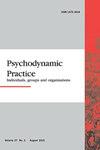“Being affected by the other”: psychodynamic supervisors’ experiences of supervisory countertransference
IF 0.4
Q4 PSYCHOLOGY, CLINICAL
引用次数: 0
Abstract
This qualitative study investigated how psychodynamically-oriented supervisors experienced supervisory countertransference towards their supervisees and their understandings of this phenomenon. Seven supervisors located in the United Kingdom (UK) were recruited. Individual audio-recorded, semi-structured interviews were used to gather the participants’ subjective accounts of this phenomenon. Data was analysed using Interpretative Phenomenological Analysis (IPA). Most of the participants described experiencing supervisory countertransference towards supervisees who were not of the same gender as them. Although definitions of supervisory countertransference have linked this phenomenon to unresolved supervisor issues and blind spots, only one supervisor specifically referred to past experiences that shaped her supervisory countertransference response. Notably, some of the supervisors continued to be affected by their experiences many years after the supervision ended. The study’s findings underscored the importance of attending to and processing perturbing supervisory countertransference. Future research could explore the ways in which supervisory countertransference is shaped by gender dynamics and its contribution to supervisory discord.“被他者影响”:心理动力监督者的监督性反移情体验
本质性研究探讨了心理动力导向的管理者如何对其被管理者经历监管反移情,以及他们对这种现象的理解。在联合王国(英国)征聘了七名监督员。使用个人录音、半结构化访谈来收集参与者对这一现象的主观描述。数据分析采用解释现象学分析(IPA)。大多数参与者描述了对与他们性别不同的管理者的监管反移情。尽管监管反移情的定义将这种现象与未解决的监管问题和盲点联系起来,但只有一位监管人员特别提到了过去的经历,这些经历塑造了她的监管反移情反应。值得注意的是,在监督结束多年后,一些监督员仍然受到其经历的影响。研究结果强调了关注和处理令人不安的监管反移情的重要性。未来的研究可以探索性别动态对监管反移情的影响及其对监管不和谐的贡献。
本文章由计算机程序翻译,如有差异,请以英文原文为准。
求助全文
约1分钟内获得全文
求助全文
来源期刊

Psychodynamic Practice
PSYCHOLOGY, PSYCHOANALYSIS-
CiteScore
0.90
自引率
0.00%
发文量
41
期刊介绍:
Psychodynamic Practice is a journal of counselling, psychotherapy and consultancy and it is written for professionals in all fields who use psychodynamic thinking in their work. The journal explores the relevance of psychodynamic ideas to different occupational settings. It emphasizes setting and application as well as theory and technique and focuses on four broad areas: •Clinical practice •The understanding of group and organisational processes •The use of psychodynamic ideas and methods in different occupational settings (for example, education and training, health care, social work, pastoral care, management and consultancy) •The understanding of social, political and cultural issues
 求助内容:
求助内容: 应助结果提醒方式:
应助结果提醒方式:


